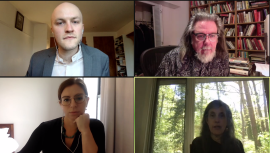American Literary Studies Beyond the Brink
When
The Chronicle Review introduced their recent collection “Endgame: Can literary studies survive?” with the bold statement, “The academic study of literature is no longer on the verge of field collapse. It’s in the midst of it.” The sentiments here expressed seem far less bold and more obvious in the midst of the unfolding effects COVID-19 is having on employment and funding in academia generally and American literary studies in particular. Various interrelated forces could be and have been identified as having contributed to this moment, such as changes in university funding sources, privatization of research, externalization of revenue, the increasing debt burden for students, threats to academic freedom, the shifting demands of professionalization, and the decreasing public valuation of humanistic study. This webinar approaches the demise of the profession by considering again what it means to continue in this work now, as well as the whys and hows of studying American literature and culture at this moment. What shape might American literary and cultural studies take in order to contest developments that have left the discipline on the brink of collapse?
Panelists include:
- Priscilla Wald, R. Florence Brinkley Distinguished Professor of English, Duke University. Focused on the intersections between the law, literature, science, and narrative, Wald’s published works include Contagious: Cultures, Carriers, and the Outbreak Narrative (Duke UP, 2008) and she is currently completing a study entitled Human Being After Genocide. Former Director of the Program in Gender, Sexuality, and Feminist Studies at Duke, Wald serves as Co-Editor of the journal American Literature and is Co-Director of CALS’ First Book Institute.
- Danica Savonick, Assistant Professor of English, SUNY Cortland. Savonick's research focuses on 20th century and contemporary U.S. literature, pedagogy, and social justice. Her first book manuscript is tentatively entitled Insurgent Knowledge: The Poetics and Pedagogy of Toni Cade Bambara, June Jordan, Audre Lorde, and Adrienne Rich in the Era of Open Admissions. Her work has appeared in American Literature, Modern Fiction Studies, and MELUS, as well as The Chronicle of Higher Education and Inside Higher Ed. Savonick is currently an American Council of Learned Societies fellow.
- Jeffrey T. Nealon, Edwin Erle Sparks Professor of English and Philosophy, Penn State. Nealon has published widely on contemporary American literature and culture, literary theory, and the state of the profession. Recent titles include Plant Theory: Biopower and Vegetable Life (Stanford UP, 2016); I’m Not Like Everybody Else: Biopolitics, Neoliberalism, and American Popular Music (U of Nebraska P, 2018), and Fates of the Performative: From the Linguistic Turn to the New Materialism (U of Minnesota P, 2021).
Moderator:
- Dillon Rockrohr, Graduate Student, Department of English, Penn State
